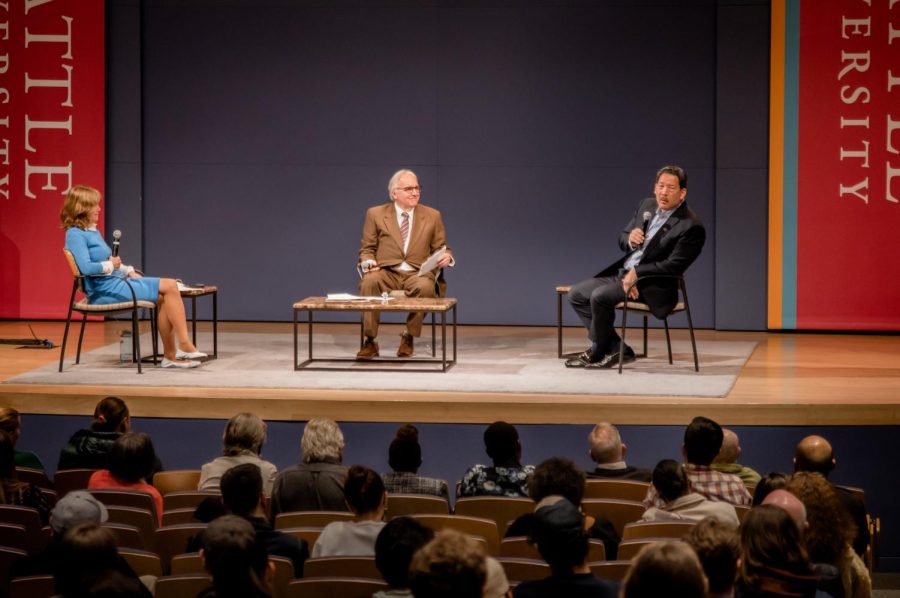Marking 100 Days in Office, Mayor Harrell Discusses Plans for Creating “One Seattle”
Seattle mayor, Bruce Harrell, speaking to Seattle University audience in Pigott Auditorium.
What direction are we moving towards regarding the pandemic? How will the city tackle the ever growing homeless and housing crisis? How can we work to make Seattle a safe city? These are several of the many questions that were posed at Seattle University’s Meet the New Mayor event, Monday, April 11.
The event, which was hosted by the Seattle U Institute of Public Service (IPS), is a part of Seattle U’s “Conversation Series,” which aims to encourage the Seattle U community to participate in open dialogue about campus concerns as well as greater issues facing Seattle. The latest installment in the “Conversations Series” marked 100 days since Seattle’s new mayor, Bruce Harrell, has been in office.
Larry Hubbell, a professor at the IPS, was one of the hosts of the night, joined by Joni Balter, a multimedia reporter, and his partner. Hubbel remarked on the intentions behind the event.
“Through our conversation series, we hope to further the dialogue regarding issues important to residents of Seattle,” Hubbell said. “We also want our students to be involved in the process. In that light, two of our [Masters of Public Administration] MPA students will be asking questions of the mayor tonight.”
Camille Rochester and Mandela Gardner, two Seattle U graduate students, spoke with Harrell about a variety of concerns, including the government’s relationship with non-profits and the mayor’s plan to follow through on maintaining the stipulations of the Green New Deal.
Harrell, who was elected in November 2021, has a reputation for being ‘tough on crime.’ When asked about his request for more officers, Harrell explained his plan to develop a third branch of the Seattle Police Department—one with no badges or guns that will focus on de-escalation. He discussed the importance of understanding that trust is a two-way street, and that police officers must earn the trust of citizens in order to properly serve their community. He said that he is searching the Seattle community for a “new kind of police officer.”
Students and staff alike on the Seattle U campus are eager to see how Harrell decides to address the various issues Seattle is currently facing. The homeless crisis and rise in living costs in Seattle was one topic that arose frequently.
Lauren Lainez, a second-year communications major, commented on the rise of housing prices.
“The cost of living just goes up and up—it’s ridiculous. I’m from Colorado and people there pay half what I do in rent and have apartments twice the size,” Lainez said.
This sentiment is not exaggerated. Since November 2020, housing costs have risen 23.3%, with Seattle homes costing on average around $1,075,000.
“My main question is what are they going to do about homelessness?” Communications professor James Hanson asked. “It seems like the efforts are just piecemeal and no real progress is being made.”
This leap in housing costs combined with the increasing levels of homelessness in the city has had a clear effect on Seattle residents. During his introduction speech, Seattle U President Eduardo Peñalver referenced a recent study, which found that two-thirds of Seattle residents have considered leaving Seattle. Peñalver described this statistic as “sobering.”
Regarding the housing crisis, Mayor Harrell said that he and the city of Seattle will be “finding every last dollar and resource available” to put towards ensuring access to housing. The mayor also mentioned his plan to revitalize the downtown area in an effort to make it a safe place to be yet again. This plan is part of his Many Hands initiative, which will aim to provide the community with the resources needed to preserve art, music, culture, small businesses and keep the city of Seattle safe.
Wolff Omar, a second-year film studies student, shared his opinions regarding Harrell’s aspirations for the city.
“He seems like a man of business with a leadership focus background looking at his previous experiences. But I still think that he needs to be more detailed in his approach on helping minorities and small businesses with large ones and not having them exploited,” Omar said.
Harrell did briefly touch on this subject, mentioning the responsibilities of large businesses in the city.
“You have a moral obligation to give back to your community,” Harrell said, referring in particular to large business corporations such as Amazon.
Several of the other subjects touched on during the event included when the West Seattle Bridge will be up and running again, what major changes have occurred since Harrell’s election and how the mayor intends to protect and preserve minority neighborhoods in the city.
Speaking to the plans he has been laying out for the city of Seattle, Mayor Harrell remarked, “we can do better than that and we will.” He spoke about creating “One Seattle” by uniting the city’s residents together to support common goals.
“I’m trying to make it cool to say ‘I love Seattle’ again,” Harrell said.


